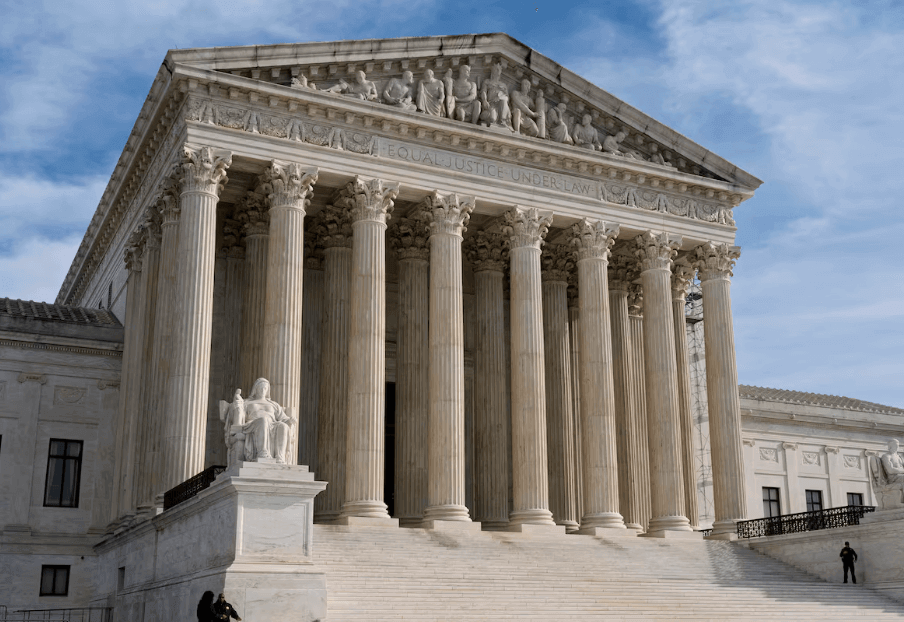最高法院维持禁止 TikTok 的法律,除非其中国母公司出售

【中美创新时报2025 年 1 月 17 日编译讯】(记者温友平编译)最高法院周五一致维持联邦法律,从周日开始禁止 TikTok,除非其中国母公司出售,最高法院认为其与中国的关系对国家安全构成的风险克服了对限制该应用或其 1.7 亿美国用户言论的担忧。美联社记者马克·谢尔曼对此作了下述报道。
出售似乎不会很快发生,尽管专家表示,一旦该法律于 1 月 19 日生效,该应用不会从现有用户的手机中消失,但新用户将无法下载它,更新也将不可用。司法部在法庭文件中表示,这最终将导致该应用无法运行。
这一决定是在候任总统唐纳德·特朗普和总统乔·拜登政府不同寻常的政治骚动背景下做出的。特朗普曾发誓要通过谈判达成解决方案,而拜登政府已表示,从周日(他任期的最后一天)开始,不会执行该法律。
考虑到 TikTok 的受欢迎程度以及他自己在该应用上的 1470 万粉丝,特朗普发现自己与参议院共和党知名人士的观点背道而驰,后者指责 TikTok 的中国所有者此前未找到买家。特朗普在决定发布前不久的一篇 Truth Social 帖子中表示,TikTok 是他周五与中国国家主席习近平通话的话题之一。
目前尚不清楚特朗普周一宣誓就任总统后会有哪些选择。如果在法律生效前已取得出售进展,法律允许暂停对该应用的限制 90 天。曾在最高法院为民主党拜登政府辩护的司法部长伊丽莎白·普雷洛加 (Elizabeth Prelogar) 上周告诉法官,目前尚不确定法律生效后出售的前景是否会为 TikTok 带来 90 天的缓刑期。
法院在一份未签署的意见书中表示:“国会已确定,剥离资产是必要的,以解决其对 TikTok 数据收集做法及其与外国对手的关系的、得到充分支持的国家安全担忧。”并补充说,该法律“不侵犯请愿者的第一修正案权利。”
大法官索尼娅·索托马约尔 (Sonia Sotomayor) 和尼尔·戈萨奇 (Neil Gorsuch) 分别提交了简短的意见,对法院的裁决表示了一些保留意见,但同意结果。
戈萨奇写道:“毫无疑问,国会和总统在这里选择的补救措施是戏剧性的。”不过,他说,他被中国可以获取“数千万美国人的大量个人信息”的说法所说服。
在辩论中,TikTok 和其母公司中国科技公司字节跳动的一名律师告诉法官,达成交易将有多么困难,尤其是考虑到中国法律限制出售使该社交媒体平台大获成功的专有算法。
根据肯塔基州去年提起的诉讼,该应用程序允许用户在大约半小时内观看数百个视频,因为有些视频只有几秒钟长。该诉讼称,TikTok 的设计让人上瘾,损害了儿童的心理健康。十多个州也提起了类似的诉讼。TikTok 称这些指控不准确。
关于 TikTok 与中国关系的争议已经成为华盛顿和北京之间地缘政治竞争的体现。
“字节跳动及其中国共产党主子在周日截止日期前有九个月的时间出售 TikTok,”阿肯色州共和党参议员汤姆·科顿在 X 上写道。“共产党中国拒绝允许出售这一事实本身就揭示了 TikTok 的本质:一款共产主义间谍应用程序。最高法院正确地驳回了TikTok以法律论据为幌子的谎言和宣传。”
美国表示担心TikTok收集大量用户数据,包括敏感的观看习惯信息,这些数据可能会通过胁迫落入中国政府手中。官员们还警告说,推动用户在应用程序上看到的内容的算法很容易受到中国当局的操纵,中国当局可以利用它以一种难以察觉的方式塑造平台上的内容。
TikTok 指出,美国尚未提供证据表明中国试图操纵其美国平台上的内容或通过 TikTok 收集美国用户数据。
国会两党多数通过了该法案,拜登于 4 月将其签署成为法律。该法案是华盛顿围绕 TikTok 长达数年的纠纷的高潮,政府认为 TikTok 构成了国家安全威胁。
TikTok 去年就该法案起诉政府,长期以来一直否认它可以被用作北京的工具。由两名共和党任命者和一名民主党任命者组成的三名法官小组在 12 月一致支持该法案,促使 TikTok 迅速向最高法院上诉。
如果没有向批准的买家出售,该法案禁止苹果、谷歌和其他公司运营的应用商店从周日开始提供 TikTok。互联网托管服务也将被禁止托管 TikTok。
字节跳动表示不会出售。但一些投资者一直在关注它,包括特朗普的前财政部长史蒂芬·姆努钦和亿万富翁商人弗兰克·麦考特。麦考特的 Project Liberty 计划表示,它及其未具名的合作伙伴已向字节跳动提交了一份收购 TikTok 美国资产的提案。该财团包括“创智赢家”主持人凯文·奥利里,但没有透露报价的财务条款。
普雷洛加上周告诉法官,该法律的生效“可能只是字节跳动需要重新考虑其立场的震动”。
题图:最高法院。J. Scott Applewhite/美联社
附原英文报道:
Supreme Court upholds law banning TikTok if it’s not sold by its Chinese parent company
By MARK SHERMAN The Associated Press,Updated January 17, 2025
The Supreme Court.J. Scott Applewhite/Associated Press
WASHINGTON (AP) — The Supreme Court on Friday unanimously upheld the federal law banning TikTok beginning Sunday unless it’s sold by its China-based parent company, holding that the risk to national security posed by its ties to China overcomes concerns about limiting speech by the app or its 170 million users in the United States.
A sale does not appear imminent and, although experts have said the app will not disappear from existing users’ phones once the law takes effect on Jan. 19, new users won’t be able to download it and updates won’t be available. That will eventually render the app unworkable, the Justice Department has said in court filings.
The decision came against the backdrop of unusual political agitation by President-elect Donald Trump, who vowed that he could negotiate a solution and the administration of President Joe Biden, which has signaled it won’t enforce the law beginning Sunday, his final full day in office.
Trump, mindful of TikTok’s popularity, and his own 14.7 million followers on the app, finds himself on the opposite side of the argument from prominent Senate Republicans who fault TikTok’s Chinese owner for not finding a buyer before now. Trump said in a Truth Social post shortly before the decision was issued that TikTok was among the topics in his conversation Friday with Chinese leader Xi Jinping.
It’s unclear what options are open to Trump once he is sworn in as president on Monday. The law allowed for a 90-day pause in the restrictions on the app if there had been progress toward a sale before it took effect. Solicitor General Elizabeth Prelogar, who defended the law at the Supreme Court for the Democratic Biden administration, told the justices last week that it’s uncertain whether the prospect of a sale once the law is in effect could trigger a 90-day respite for TikTok.
“Congress has determined that divestiture is necessary to address its well-supported national security concerns regarding TikTok’s data collection practices and relationship with a foreign adversary,” the court said in an unsigned opinion, adding that the law “does not violate petitioners’ First Amendment rights.”
Justices Sonia Sotomayor and Neil Gorsuch filed short separate opinions noting some reservations about the court’s decision but going along with the outcome.
“Without doubt, the remedy Congress and the President chose here is dramatic,” Gorsuch wrote. Still, he said he was persuaded by the argument that China could get access to “vast troves of personal information about tens of millions of Americans.”
At arguments, the justices were told by a lawyer for TikTok and ByteDance Ltd., the Chinese technology company that is its parent, how difficult it would be to consummate a deal, especially since Chinese law restricts the sale of the proprietary algorithm that has made the social media platform wildly successful.
The app allows users to watch hundreds of videos in about half an hour because some are only a few seconds long, according to a lawsuit filed last year by Kentucky complaining that TikTok is designed to be addictive and harms kids’ mental health. Similar suits were filed by more than a dozen states. TikTok has called the claims inaccurate.
The dispute over TikTok’s ties to China has come to embody the geopolitical competition between Washington and Beijing.
“ByteDance and its Chinese Communist masters had nine months to sell TikTok before the Sunday deadline,” Sen. Tom Cotton, R-Ark., wrote on X. “The very fact that Communist China refuses to permit its sale reveals exactly what TikTok is: a communist spy app. The Supreme Court correctly rejected TikTok’s lies and propaganda masquerading as legal arguments.”
The U.S. has said it’s concerned about TikTok collecting vast swaths of user data, including sensitive information on viewing habits, that could fall into the hands of the Chinese government through coercion. Officials have also warned the algorithm that fuels what users see on the app is vulnerable to manipulation by Chinese authorities, who can use it to shape content on the platform in a way that’s difficult to detect.
TikTok points out the U.S. has not presented evidence that China has attempted to manipulate content on its U.S. platform or gather American user data through TikTok.
Bipartisan majorities in Congress passed legislation and Biden signed it into law in April. The law was the culmination of a yearslong saga in Washington over TikTok, which the government sees as a national security threat.
TikTok, which sued the government last year over the law, has long denied it could be used as a tool of Beijing. A three-judge panel made up of two Republican appointees and a Democratic appointee unanimously upheld the law in December, prompting TikTok’s quick appeal to the Supreme Court.
Without a sale to an approved buyer, the law bars app stores operated by Apple, Google and others from offering TikTok beginning on Sunday. Internet hosting services also will be prohibited from hosting TikTok.
ByteDance has said it won’t sell. But some investors have been eyeing it, including Trump’s former Treasury Secretary Steven Mnuchin and billionaire businessman Frank McCourt. McCourt’s Project Liberty initiative has said it and its unnamed partners have presented a proposal to ByteDance to acquire TikTok’s U.S. assets. The consortium, which includes “Shark Tank” host Kevin O’Leary, did not disclose the financial terms of the offer.
Prelogar told the justices last week that having the law take effect “might be just the jolt” ByteDance needs to reconsider its position.

